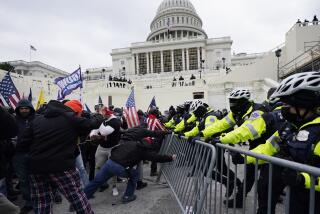Around the Kremlin, Days of High Drama
Once again, rumors about a conflict between Mikhail S. Gorbachev and Yegor K. Ligachev are sweeping through Moscow.
The occasion this time was prompted by a large article in a normally liberal Soviet newspaper, Sovietskaya Rossiya, which sharply criticized excesses in efforts to repudiate the past. Three weeks later, the Sovietskaya Rossiya article, supposedly a Ligachev manifesto, was criticized by Pravda and Gorbachev supposedly achieved a victory--at least temporarily--over the much-more conservative No. 2 man in the Kremlin.
To hear Soviet intellectuals tell it, the air is filled with tension and the outcome is hanging in the balance. Gorbachev is leading a heroic struggle against overwhelming conservative opposition; only the intellectuals are supporting him.
It is all very high drama. But this is the problem: Much of it is drama, not reality.
Rumors about Politburo conflict must be handled with the greatest of care. Since the 1940s, the Soviets have floated stories about embattled general secretaries and their overwhelming conservative opposition in the Politburo. In 1948, even President Harry S. Truman was taken in, talking about “good old Joe” Stalin being a prisoner of the Politburo.
No doubt, Yegor Ligachev is more conservative than Gorbachev. He is 68, and no one expects him to hold on as second secretary until the next Communist Party congress in 1991. The best bet has always been that he would become chairman of the party’s control committee. Probably something like this is now under way.
But if so, it is not because Ligachev has almost defeated Gorbachev. Ligachev’s power has been grossly exaggerated. As new men were brought into the Politburo in 1987, Ligachev’s independent power steadily shrunk. The election in February of Georgy P. Razumovsky, a very close Gorbachev associate, to the Politburo meant that Ligachev had lost any control over personnel selection. And historically, dramatic incidents of opposition have been the last gasps of a contender on the way out.
What is going on with the rumors? First, the liberal intellectuals are extremely anxious because of past changes in Soviet policy. They are looking for any sign of reversal of policy and then reacting to it.
Indeed, the intellectuals are handling many issues--especially historical ones about the Stalin era--in such a one-sided manner as to produce the criticism they fear. The Sovietskaya Rossiya article, although itself one-sided, also contained many points that were quite accurate.
Not long ago a leading Soviet intellectual was asked privately whether he didn’t think that the Stalin issue was being overplayed (the purges, after all, did take place 50 years ago) and whether Nikita Khrushchev was not being whitewashed (after all, Khrushchev did forbid the publication of such works as “Doctor Zhivago”).
The intellectual’s answer was direct, and representative of those who desire reform: “I don’t care about history. These men are all symbols. Stalin is a symbol of repression, Lenin is a symbol of what the revolution could have been, and Khrushchev is a symbol of the loosening of repression.” And although he didn’t say it directly, Gorbachev is seen by the reformers as a symbol of hope, Ligachev as a symbol of conservatism.
Not surprisingly, such an approach produces a response, all the more so when today’s conservatives are sometimes being lumped together as Stalinist.
Gorbachev himself is playing a very complicated and sophisticated political game. Leaders always use their chiefs of staff as their no-men or bad cops. This has been Ligachev’s role. Meanwhile, Gorbachev exploits talk about opposition and bureaucratic resistance in order to keep the intellectuals on his side and, paradoxically, supporting his dictatorial consolidation of power.
Gorbachev also is quite capable of using a “power struggle” with Ligachev as a way of keeping the Soviet people distracted as the Red Army begins its retreat from Afghanistan. We know how a skilled President such as Ronald Reagan can control the domestic agenda by putting his own spin on news stories. But we somehow never think of Gorbachev in the same way. We have seen his public-relations skill abroad, however, and should not think it lacking at home.
The problem for us is not to be misled. Gorbachev is not the embodiment of all the intellectuals’ hopes. He wants a mild dictatorship like Franco’s Spain. But he faces a society that has become largely educated and middle class. It wants more.
If we accept the intellectuals’ version that every sign of authoritarianism is a defeat for Gorbachev, we will underestimate his strength as an adversary. It has been a costly foreign-policy mistake in the past, and will continue to be so.
More to Read
Start your day right
Sign up for Essential California for news, features and recommendations from the L.A. Times and beyond in your inbox six days a week.
You may occasionally receive promotional content from the Los Angeles Times.






